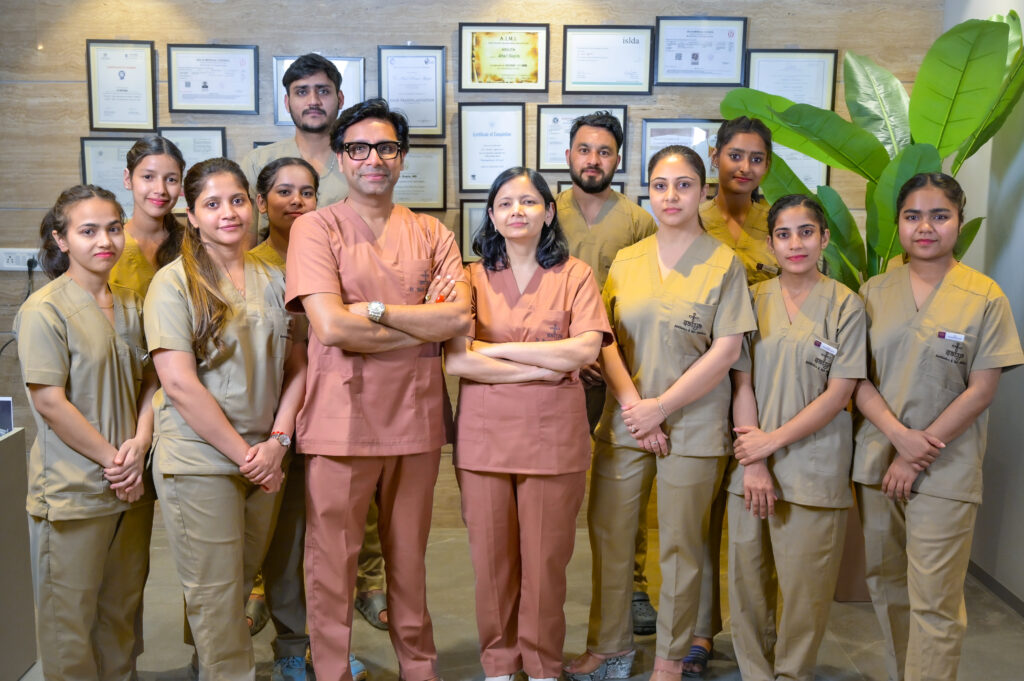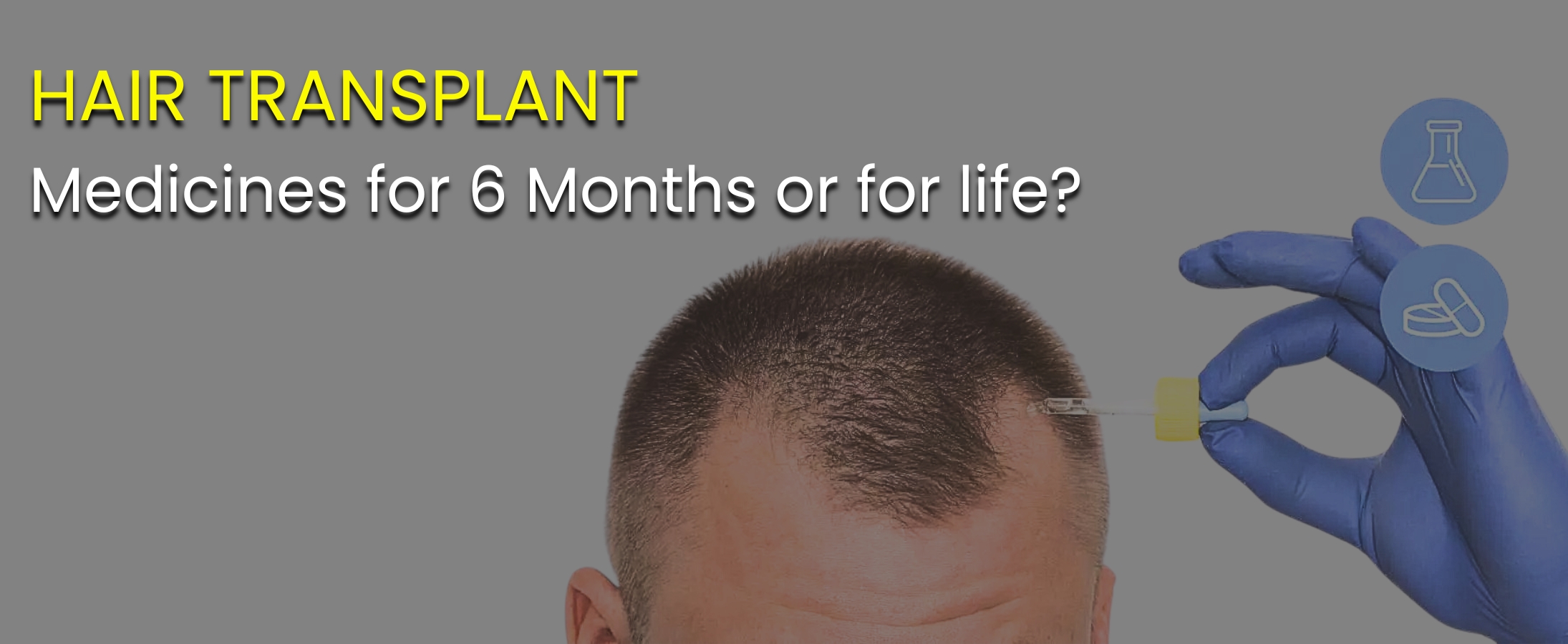
What Should You Do When Your Clinic Tells You to Take Medicines for 6 Months or Life?
Advice on post-transplant medications is sometimes contradictory in hair transplant clinics. While some advise using them for just 6 months or 1 year, others insist on lifetime use. On the other hand, some clinics claim that hair transplants are permanent and need no medication at all. Though apparently beneficial, these techniques can be deceptive and, in certain situations even harmful.
Dr. Shail Gupta, Founder and Chief Hair Transplant Surgeon at Satya Skin & Hair Solutions, sheds light on the truth behind post-transplant medication, the risks of overuse, and the ethical approach patients should follow to achieve natural, lasting results with minimal health risks.
Founder and Chief Hair Transplant Surgeon at Satya Skin & Hair Solutions, Dr. Shail Gupta clarifies the reality behind post-transplant medication, overuse risks, and ethical behavior patients should follow to get natural, long-lasting results with the lowest possible health risk.
The Problem with Medication Misuse After Hair Transplants


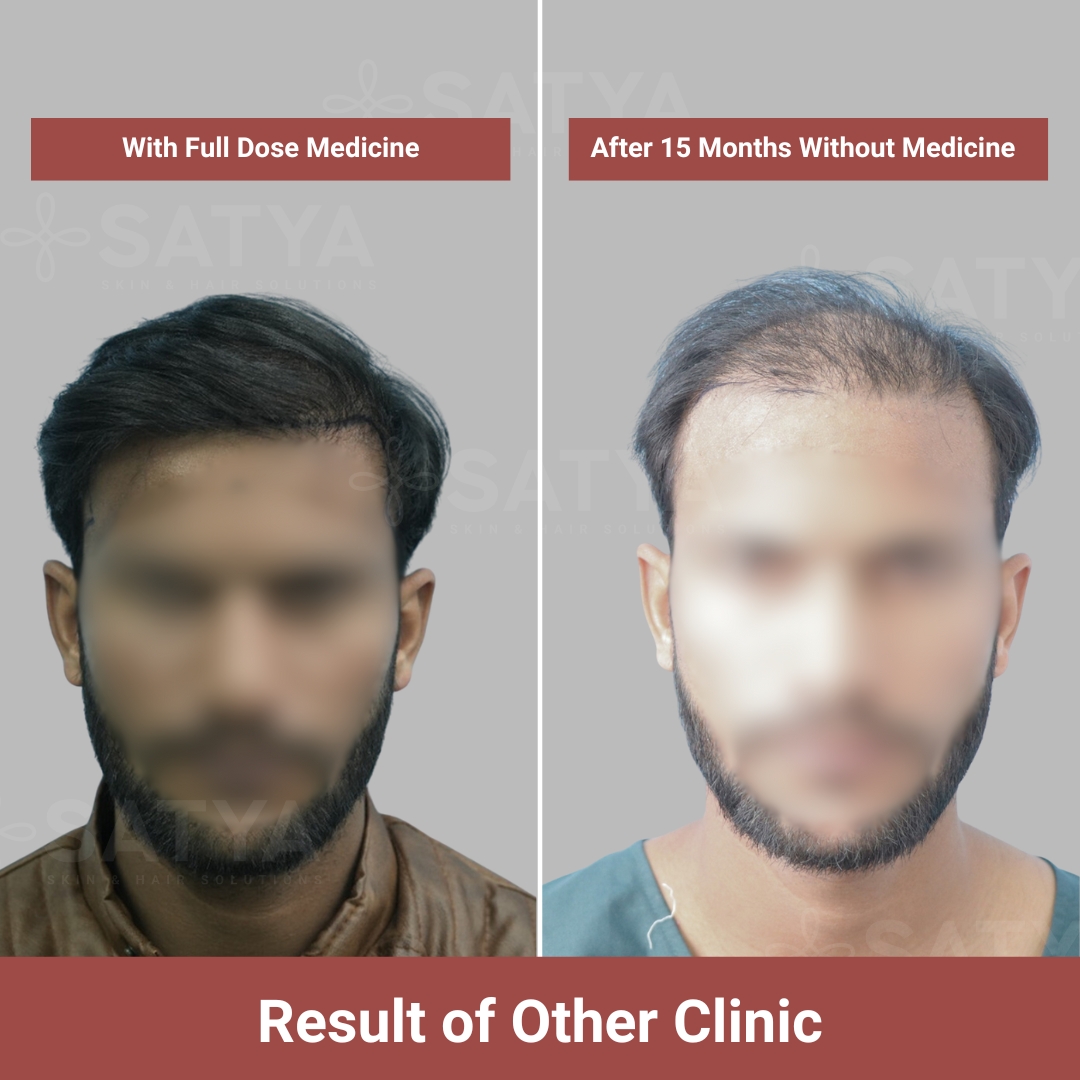
1. Short-term medication for Quick Results
Many clinics recommend taking medication like finasteride or minoxidil for just 2–6 months.
While this short-term use can boost initial results, the effects are temporary. The results, which can be 80–90% due to medication, start to fade as soon as the medication is stopped.
This practice is a strategy to ensure patients get short-term satisfaction, helping clinics secure more referrals, even though the results are destined to fail.
2. Lifelong Medication Without Transparency
Some clinics recommend lifelong medication, claiming it is necessary to maintain the results. However, they often hide the risks, such as:
Tolerance Development: Over time, the same dose becomes less effective, requiring higher doses to achieve the same effect.
Increased Health Risks: Higher doses come with more significant side effects, which clinics fail to disclose.
Lack of Alternatives: Patients are not informed about the option of micro-dosing, which can provide similar benefits with fewer risks.
3. The Misleading “No Medication Needed” Claim
A few clinics promise that hair transplants are permanent and require no medication. This oversimplification ignores the reality that:
Transplanted hair can thin over time.
Progressive hair loss in non-transplanted areas may require medication to maintain overall density.
THE ILLUSION OF MEDICINES IN HAIR TRANSPLANT



No transplant done, result of only medicine
Medicines can make a very ordinary hair transplant look great and can be a big cover-up for over over-promised number of grafts and an over-promised skill set from the surgeon. The effect medicine can have on the hair transplant in addition to preventing further thinning of hair are the following:-
- Overall coverage: Re-growth of existing miniaturized hair, leading to coverage of bigger areas, even in the areas where no transplant is done. This would be counted as a hair transplant.
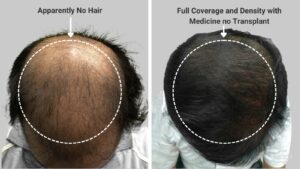
- Overall density: Making the transplanted hair thicker, thus getting more density which is free credit for the surgeon.
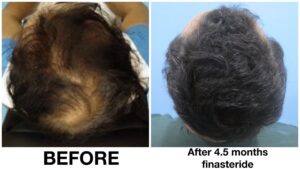
- Hairline Aesthetics: Growing softer hair in the hairline zone can make even a very ugly hair transplant with gaps.
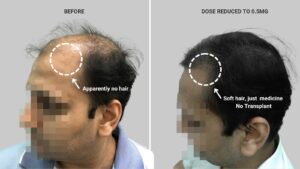
- Better donor appearance: Medicines can make the donor hair thicker, so even a completely exhausted donor which is over-harvested by FUE will look better than its actual position but when the medicines are stopped or the medicine stops working on your head, you will see that the donor is devastated.
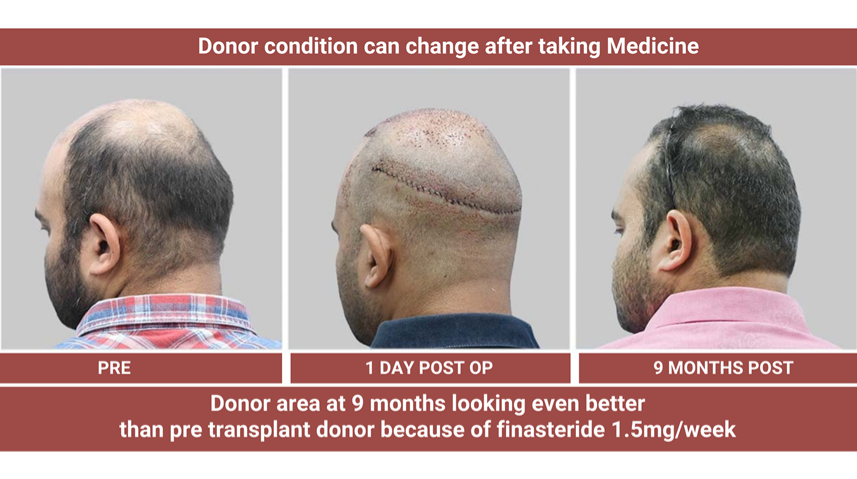
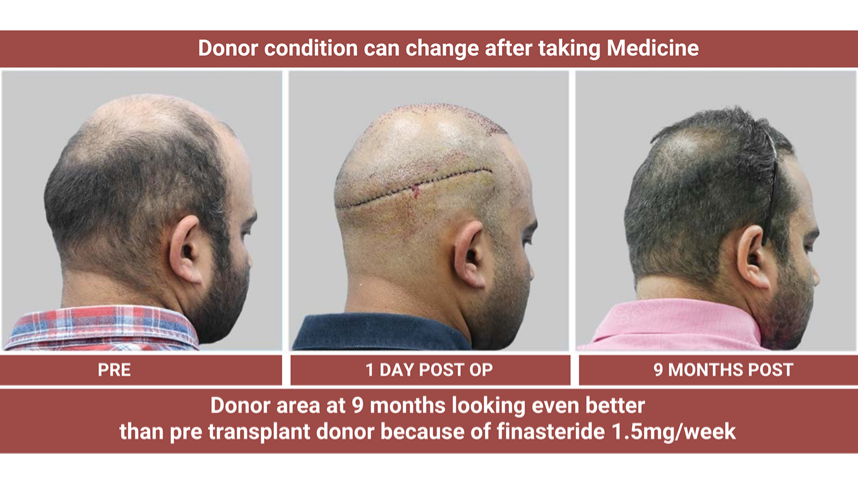
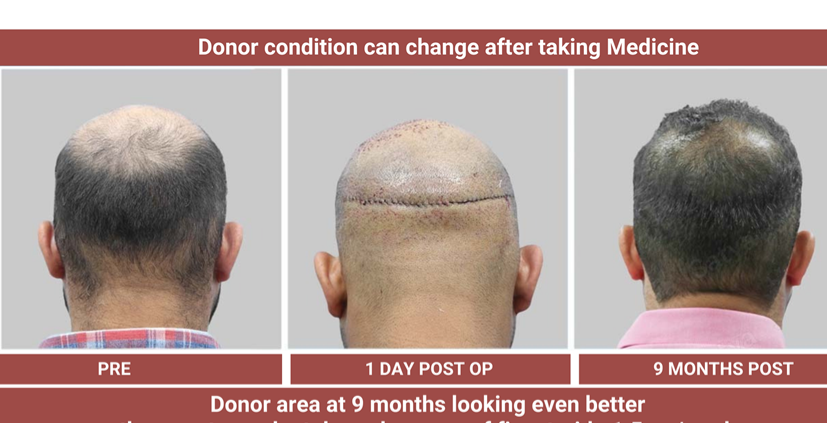
- Free Hair & Free Credit: Hair growth by medicine is absolutely free home run for the doctor at the cost of the patient’s health. That is why not many doctors acknowledge the benefits of the medicine or always underplay it. They will just say that medicine is given to prevent further hair loss which is a complete lie.
Why These Practices Are Harmful
- Patient Misinformation: Clinics prioritize selling transplants over educating patients about the role and risks of medications.
- Short-Term Gains, Long-Term Losses: Clinics over-promise results by relying on medication to exaggerate outcomes, hiding that these results won’t last without continued medication.
- Health Risks: Lifelong or excessive medication can lead to serious side effects, including hormonal imbalances.
The Ethical Approach: Satya’s MIN-MED Approach™
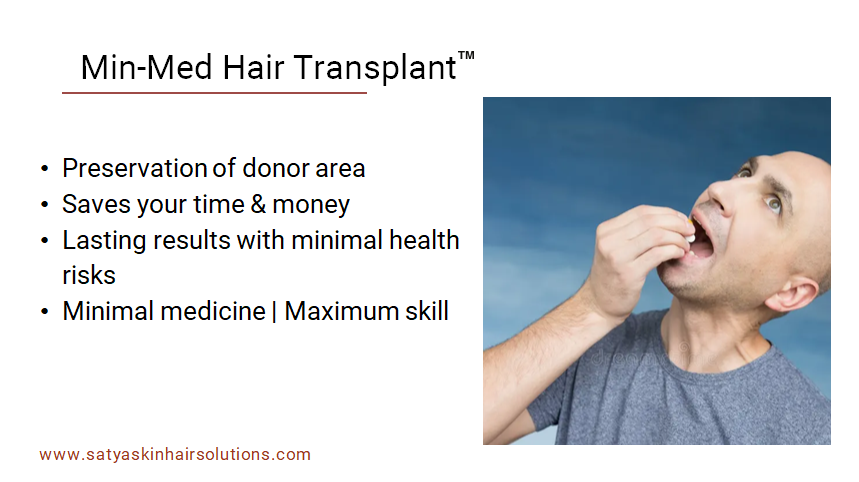
At Satya Skin & Hair Solutions, we have developed the MIN-MED Approach™ to ensure ethical, sustainable, and health-focused hair restoration.
What Is the MIN-MED Approach™?
- Minimal Medication Dependence:
- We start with no or minimal medication to avoid dependency and minimize side effects.
- Tolerance Management:
- Medication doses are adjusted safely to ensure effectiveness without risking your health.
- Long-Lasting Results:
- A balanced approach ensures results that last without over-reliance on medication.
Why Satya’s Ethical Hair Transplant™ Stands Out
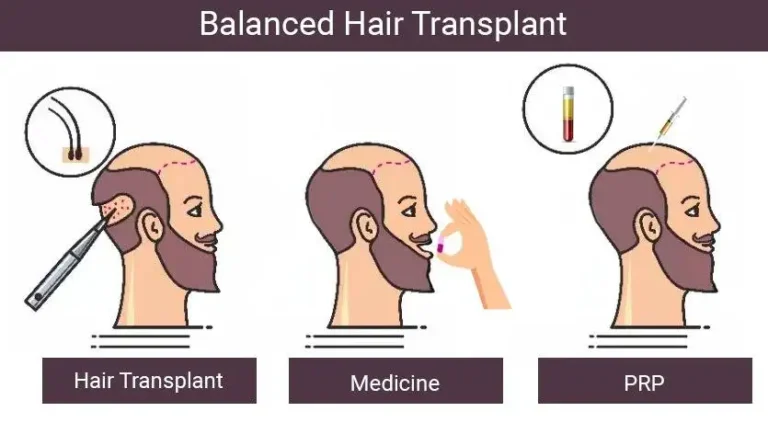
1. Donor Preservation:
Your donor area is a finite resource. Preserving it ensures options for the future, especially as transplanted hair and natural hair are prone to thinning over time.
2. Saving Time, Money, and Hair:
We don’t push endless PRP sessions or unnecessary medications, saving you from wasting time, money, and donor hair.
3. Results That Last:
Our Balanced Hair Transplant™ approach respects your resources, combining skill, honesty, and planning to deliver sustainable results.
What Should You Do If Your Clinic Recommends Medications?
Here’s how to be sure you’re choosing the correct path:
- Ask Questions:
- How long will I need to take the medication?
- What are the potential side effects?
- What happens if I stop taking it?
- Are there alternatives like micro-dosing?
- Understand the Role of Medication:
- Medication can support hair growth and density, but relying too much on it can lead to short-lived results.
- Avoid Clinics That Push Lifelong Medication Without Transparency:
- Lifelong medication should never be the default recommendation.
- Don’t Fall for Short-Term Promises:
- If your clinic tells you that medication is only needed for a short time, it’s likely a strategy to boost short-term satisfaction without considering long-term results.
A Word from Dr. Shail Gupta
“At Satya, we believe in empowering patients with honest information. Medication has its place in hair restoration, but overusing or underestimating its role can harm your results and health. Our MIN-MED Approach™ ensures that you achieve long-lasting, natural results with minimal risks. Your trust and health are our priorities.”
Conclusion: Invest in Ethics, Not Shortcuts
Medication can be a valuable tool in hair restoration, but its misuse by clinics is a widespread problem. Whether it’s short-term prescriptions to boost initial results or lifelong recommendations without transparency, these practices prioritize profits over patients.
At Satya, our ethical approach, backed by the MIN-MED philosophy, ensures you receive care tailored to your needs, balancing skill, honesty, and long-term health.
🔗 Contact Satya Skin & Hair Solutions today to learn more about ethical hair restoration practices.
Choose lasting results. Choose Satya.
Look good for sometime vs lifetime

Know the secrets of long lasting results
Read Some of our important Blogs

Why Choose Satya?
20+ Years of Expertise – Renowned in dermatology and hair restoration with a legacy of excellence.
Globally Accredited – Affiliated with the American Academy of Aesthetic Medicine.
Tailored Treatments – Personalized care crafted to suit your unique needs.
World-Class Facilities – State-of-the-art laser and surgical technology. –
Specialists in Corrective Treatments – Experts in resolving unsatisfactory results from other clinics.
265,000+ Satisfied Patients – Trusted worldwide for successful outcomes and client satisfaction.
Comprehensive Care – From skin lasers to advanced hair restoration under one roof.
Ethical & Patient-Centric – Transparency and patient well-being are our priorities.
What Our Patients Are Saying






Frequently Asked Questions
Medications such as minoxidil and finasteride can help to improve density and sustain already shrunken hair, therefore enhancing transplant results. Still, depending just on medicine could cause unwanted effects over time and produce only transient benefits.
Yes, but depending on how bad your hair loss is now. Ethical clinics such as Satya Skin & Hair Solutions utilize minimal medications to ensure long-lasting effects without encouraging lifetime reliance.
Medication use throughout a lifetime might cause tolerance, in which case more doses are required for the same result. This raises the possibility of hormone abnormalities, scalp irritation, and other medical problems.
Certain clinics utilize medications to boost temporary outcomes, therefore creating the impression of density and success. This sometimes misleads patients, nevertheless, and covers overharvested donor locations or inadequate surgical ability.
Stopping medications can cause already shrunken hair to fall out, hence lowering the density. Still, the transplanted hair will not change as long as the transplant is carried out ethically.
Satya Skin & Hair Solutions’ MIN-MED Approach™ ensures patient safety and wellness while stressing low medicine use for long-term, natural results.
Transplanted hair is permanent; treated natural hair may thin over time. Minimal medication or alternatives like micro-dosing may be required for density maintenance, ethical clinics will explain.
Profit-driven unethical clinics schedule needless PRP sessions. After one or two treatments, PRP advantages level off; repeated sessions might cause scalp trauma without yielding any improvement.
Surely. Using balanced transplant techniques and micro-dosing methods, ethical clinics like Satya Skin & Hair Solutions help to lower medication reliance while maintaining outcomes.
A trustworthy clinic will give long-term outcomes, donor preservation, and ethical drug use first priority. Steer clear of facilities pushing lifetime drugs, overpromised PRP treatments, or temporary outcomes.
Take Our Quick
Hair Loss Quiz
Find out the best treatment for your
hair loss today


